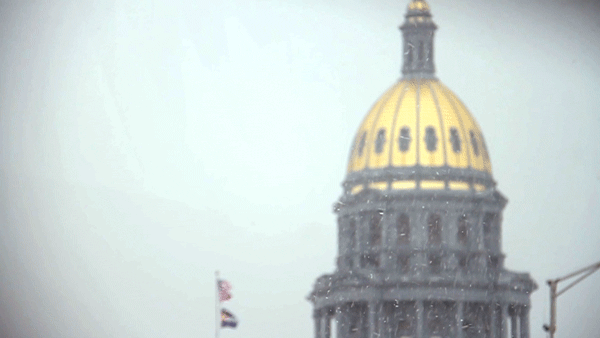
Colorado has a pretty good economic outlook for the next year, but economists working for Gov. John Hickenlooper are already looking for ways to cut an additional $52.4 million from the 2017-18 budget proposed last month.
There's a number of factors here, but a big one is that under Colorado's Taxpayer's Bill of Rights, the state has to return money to taxpayers if revenue increases too much.
"People see a healthy economy and assume the state budget is healthy," said Henry Sobanet, director of the Governor's Office of State Planning and Budgeting. "We are not allowed to keep all the money we get, so depending on the source of the money, we get budget shortfalls."
The $28.5 billion requested budget that Hickenlooper submitted Nov. 1 represents a spending increase of 3.3 percent over this fiscal year, but it also identifies $500 million in cuts because available revenue isn't enough to fully fund education, repay money that was drawn down from reserves, cover Medicaid costs and pay for a projected $195 million in TABOR refunds.
New economic forecasts released Tuesday from the Governor's Office of State Planning and Budgeting and the Colorado Legislative Council predict that TABOR refunds will be even larger -- $247.7 million, according to the governor's office, and $279.4 million, according to the legislature's economists.
TABOR refunds are triggered when revenue increases too much from the previous year.
In addition to TABOR refunds, the state will have to take money from the general fund to pay for severance tax refunds to oil and gas companies after the Colorado Supreme Court found those companies could deduct transportation, manufacturing and processing costs.
So that means even more money has to come out of the budget. Sobanet said the governor's office hasn't identified yet where those adjustments will be made. Amendments will be submitted in January. Legislators, of course, will have their own ideas.
Last year, Hickenlooper and Democratic legislators tried to have one source of revenue -- the hospital provider fee -- reclassified as an enterprise fund. Enterprise funds cover their own costs through fees and don't count toward TABOR, so changing how the provider fee is classified would reduce the size of the rest of the budget -- and reduce any possible TABOR refund.
The provider fee is charged to hospitals and generates federal matching dollars. The money then goes back out to hospitals for uncompensated care and other programs. Last year, as part of a budget deal, Hickenlooper reduced the amount of money collected under the fee, and this year's budget calls for a similar move.
In an interview with Colorado Public Radio last week, Hickenlooper said he would continue to work to reclassify the hospital provider fee, but he was not particularly optimistic.
"I think we have to recognize that there’s a serious possibility, maybe even a probability that we’re not going to succeed in the hospital provider fee because ... nothing’s changed," he said.
Republicans still control the state Senate, and most Republicans see efforts to reclassify the hospital provider fee as an end-run around TABOR.
In an emailed statement, House Republican Leader Patrick Neville of Castle Rock said the state has adequate funds to meet its needs.
"Overall, Colorado's economy is improving and that is encouraging news, but there are still many regions that are struggling and legislators need to pay close attention to the economic impacts that new legislation could have on Colorado's small businesses," he said. "The bottom line is our general fund revenue continues to increase, and we have the funds to address Colorado's most pressing needs. Lawmakers simply need to begin this session focused on our top priorities and committed to responsible spending."
Democrats, though, issued their own statement that decried the unfairness of cutting education spending because the state is taking in more money. They said TABOR and the Gallagher Amendment, which limits residential property tax rates, are contributing to an unsustainable situation that ultimately requires larger changes than just balancing the budget for one year.
"Teachers, providers and those who rely on our social safety net, like people with developmental disabilities, are punished when the economy is doing well, and they’re punished when the economy is doing poorly," said Rep. Millie Hamner, a Democrat from Dillon and chair of the Joint Budget Committee. "We know there’s a lot of good thinking going on about ways to alleviate some of the pressure on our budget, both in the short term and the long term, which is very much welcome. But it will require a commitment to action from both parties to get something done."
The governor's economic forecast predicts that general fund revenue will grow by 5.1 percent in the fiscal year that runs July 1, 2017, to June 30, 2018, while economists from the Colorado Legislative Council, who do their own forecast, predicted revenue growth of 5.6 percent.
The economic forecast predicted "modest" growth, with new business formation continuing to create more jobs and an OPEC agreement to limit production giving a boost to domestic oil and gas production. Housing remains strong, and migration into the state boosts the overall economy and tax revenues.
However, low unemployment and the corresponding tight labor market continue to limit businesses' ability to expand, particularly along the Front Range. The legislative economic forecast also noted an aging population and rising interest rates as factors that could constrain growth.
Both forecasts sounded a note of caution about future uncertainty.
"The recovery in energy, manufacturing, and export industries remains fragile and dependent upon global factors," the legislative council staff wrote. "Elevated global political uncertainty poses a significant risk to the economic outlook."













